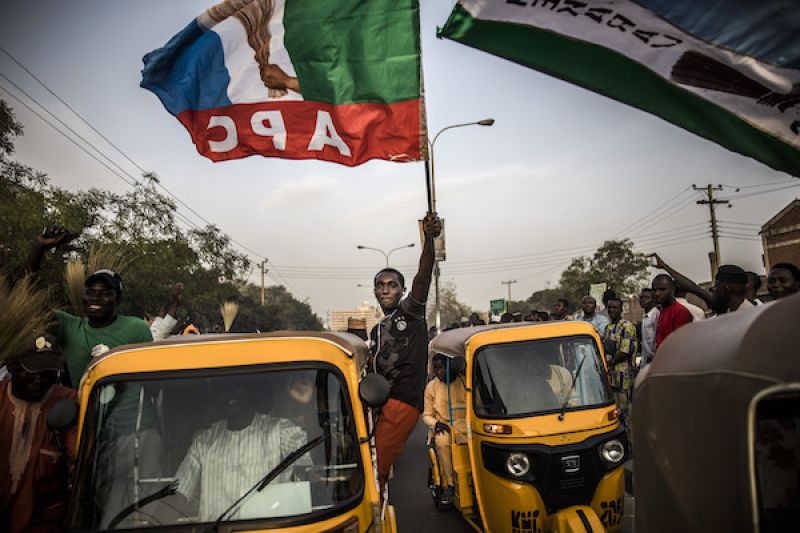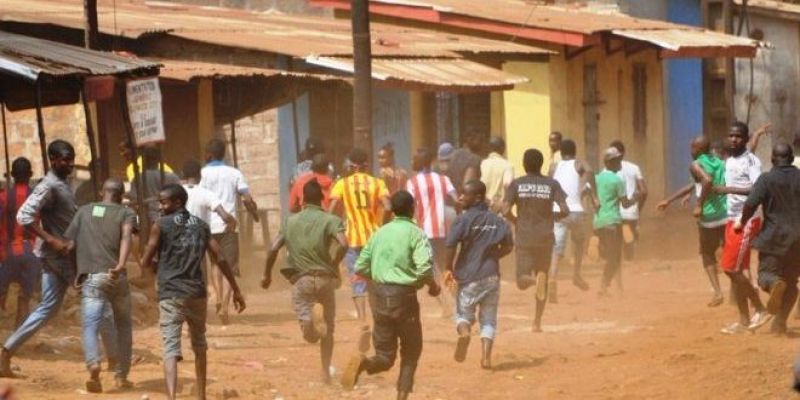ORIGIN OF ABA (the Enyimba City)
Posted by Onyembi, Emenike Vincent | 8 years ago | 5,733 times

In the ongoing bid to return the glory of Aba, the Enyimba City, by the Dr Okezie Victor Ikpeazu led Administration, one may be advised to know the origin and the making of this Japan of Africa, Aba, as to really see the need for this hilarious glory to be returned.
Before I go on, I wish to acknowledge the proactive and commendable effort of Chief John Osuala in his work "The Original History of Aba Township " (2000), published by the Monarch Communications.
Researchers state that about six hundred years ago, there was a big, grand cultural festival in Amaku, in Ikem Autonomous Community near Nvosi in today's Isiala Ngwa South Local
Government Area. In the course of this grand festival, some confusion arose from bitter
arguments, which inexorably resulted to a big intra village fight amongst the inhabitants of
Amaku Village. When the cloud of confusion and rage of fighting ended, many inhabitants of
Amaku Village lay dead, and greater chaos ensued.
The gravity of the tragedy, and the need for safety, and security in a new environment, and of
course the fiery spirit of adventurism catapulted three brothers from Amaku Village, Aba, Mgbede,
and Akpara, to move away from their strife- torn Amaku, Ikem homeland.
The oldest and leader of the three brothers, Aba Amaku detected a brand, natural path in the
forest, a track created by numerous gigantic elephants. In those centuries ago, it was
reported that elephant tracks were then used as roads. And the wild elephants were moving up
and down in search of drinking water, because the dry season was very severe, and streams and
rivers were then very difficult to locate in certain areas.
Aba Amaku, according to oral tradition, was happy in discovering this elephant tracks (Okpo
Enyi), also called (Kpara-Kpara) by people of those days. So Aba, urged his two other brothers,
Akpara and Mgbede, to accompany him to follow this elephant track and see where it will lead
them. They were almost like the patriarch Abraham, who left the Ur of the Chaldeans, heading to a land he did not know, in obedience to the call of (Chukwu), Almighty God.
They encountered a lot of difficulties on their journey. They had no drinking water, no food and
the worst of it all, no shelter crowned by unrelenting mosquito bites, which caused most of their family members to be sick, with the killer malaria disease. Not excluded was the threat to life posed by innumerable wild animals such as leopards, lions, tigers etc. After enduring these difficulties, following several days of trekking with their wives and children, Akpara's health
was badly affected. And he informed his brothers, Aba and Mgbede that he was no longer moving further south, and would settle down immediately. The virgin land, which Akpara Amaku settled, and erected mud huts with leaves and branches of trees, which sheltered him and his family, is today's Akpara Town. This is the home of the very popular Eke-Akpara Market, near the Nigerian National Petroleum Corporation (NNPC) Depot in Osisioma L. G. A. So Akpara ended his fight from Amaku Ikem near Nvosi, which he started with Aba and Mgbede.
The two brothers, courageously contributed with the hazardous journey down south. After a while,
they got tired and very thirsty. With no drinking water being available, they hit on the idea of getting coconut liquid (water), from wild coconuts hanging in bunches, all over their resting place.
Still with no stream or pond found, Mgbede complained of being very weak and sick, and would no longer go forward. Since there was no adequate medical treatment in those days, Mgbede's spirited efforts to survive proved abortive. He finally gave up the ghost and died. After his burial by his brother Aba, Mgbede's children opted not to go further southwards with their uncle Aba, but to stay put where their father Mgbede was buried.
These children then quickly erected mud huts, and roofed the huts, with tree branches and leaves. As they settled down in this new home, they named this area Umu-Mgbede, home for the children of Mgbede.
Aba Amaku bade the children and wives of his brother Mgbede farewell, after the normal funeral rites, he continued with his journey following the elephant tracks, which seemed unending. He however consoled himself, and asserted that he would follow these tracks to know where it ended, and presumably find something good there. In fact, he vowed that he must follow these tracks and reach water somehow.
After so many days, according to oral tradition, Aba and his family members sighted a valley. On getting to the valley, he discovered a pool of water and felt very happy. He called this valley Ogwugwu Ariaria which name it answered till this day. Aba decided to settle down a little before moving further. On inspecting the valley thoroughly, he discovered another pool of water.
So Ogwugwu Ariaria near Umuode and Abayi Ogbunigba, were Aba Amaku's first place of settlement. He replicated the same mud huts and thatched roots with tree branches and
leaves, earlier erected by his two brothers, Akpara and the late Mgbede's children. A few years later, a severe and acute dry season was on, and this led those pool of water to dry up, with no trace again in the valley.
Trees shrivelled up, grasses dried up. Even wild animals in the forest around Ogwugwu Ariaria and environs, began to die one after another. Women and children became so pummeled with heat and dust to the extent that their father, Aba Amaku felt it very much, and lamented it greatly about this sad turn of events for him.
In response, to contain this ugly development in his state of affairs, Aba began to offer ritual
sacrifices with the belief that, the stream would return to him again, and settle in its former river
bed. This traditional sacrifice, was named Ichu-Ihu-Miri (to seek the face of the river) by the
patriarch Aba.
After numerous sacrifices, Aba called his children to dig deep holes. Some hours later, water
gushed up in the already dug up holes besides the pool. The extensive animal sacrifices he
made, before he found water again, made him call the place Ife Obara-Aba, literally Place of
Blood. He lived for a long time in this area, even though he was not yet satisfied with the degree
of water supply available to his family.
Somewhere in his mind, he was sure he could improve on what was immediately available to
his family. Suddenly, one severely hot afternoon, during the
dry season when the temperature was at the boiling point, Aba Amaku saw a group of
elephants on their tracks, marching majestically southwards. He immediately called on his grown
up sons, to accompany him on an expedition to discover the destination of the elephants.
They followed the elephants at a safe distance for some hours. And finally Aba at the head of
the expedition saw the elephants get to a certain big stretch of water, the size of which he had
never seen before.
In fact, he saw that there was a big difference between this stretch of water, and the pools of
water in his Ife Obara residence near Umuode.
This body of water is today's Aba River. It was then a clean and bluish body of water, with the
capacity to enable steamboats navigate in its expanse, and stretches from Aba to Azumini, and
then to the Atlantic Ocean.
Aba did not know about all these then. He and his sons, were only content to look at the river,
and it over and over again, to ascertain whether it was fit for human consumption. Indeed, the
sight of the sparkling water, gave Aba much delight, and the joy of his three sons Onyeukwu,
Wochicha and Ukalaghala, knew no bounds.
To test the fitness of the water for human consumption, Aba took an earthern ware container he was having with him, filled it with this surprisingly sparkling water, and hung it up again on his shoulder. Then turning to his three sons, he raised the earthern ware vessel and drank the water from the river. He told his sons that this may be poisonous water, capable of killing someone. He then told them to go and hunt and that if on coming back they found him dead, they should bury him at the base of the near-by tree. He pushed himself to that tree, and rested his back at its trunk in a posture of someone waiting to see the reaction of the water he drank in his body.
While reclining at the tree trunk, Aba watched as the huge elephant crossed over the river and plodded away into the area now known as Ogbor-hill. Aba saw that the ground where the
elephants trod and stooped down to drink water, sunk in a little because of the enormous weight
of those elephants. No wonder, he reminded himself, that these elephants pass through these
tracks in search of the water of this river. Aba continued studying the movement of the
elephants in the river, his mind now removed from the issue of whether the water was fit for
consumption, or not, until his three sons came back. They found him not only alive, but in top,
hearty spirits. A brief consultation and exchange of views, reportedly took place between Aba and
his three eldest sons, and he decided that this virgin land near this great body of water was
better, and more habitable than his previous abode in Ife Obara vicinity.
Consequently, he directed Onyeukwu, his eldest son to go back with his brothers, Wochicha and
Ukalaghala, to bring his wives and other children out the Ife Obara. He further directed Onyeukwu
to inform his entire family, that the pursuit of the elephant trail had led him to a better place, and
where he would like to be buried if he died.
Onyeukwu then led his brothers back to Ife Obara, where he broke the good news about a new home filled with drinking water and other delights all year round. He told them also that
Aba their father, was eagerly waiting for their return trip back to him at the bank of the river.
The entire family of Aba, hearkened to the directive of their father, got ready and joined
Onyeukwu, who led them back to Aba.
So this was how Aba and his family quit the Ife Obara area. This former place which his father
has left with their shrine, Aba named it, Ihu Ala Ubi (Face of the Farmland), and directed that
his children must pay yearly visit to its shrine. And in his new environment, Aba called his
shrine, Ihu-Ala-Ulo (Face of the Home). He equally told them to worship Almighty God,
through this shrine so that he would provide them abundant harvest, good health, and general
prosperity and fame.
This new home, Aba called it, Okpokoro-Ugwu Aba. This particular spot, reportedly covers the
area of the National Museum of History, Office of the Chairman, Aba South Local Government,
National Electric Power Authority (NEPA) head office, and the Aba Town Hall. This area was the
first official traditional compound of late Chief Aba Amaku, the founder of Aba settlement.
In our next discussion, we shall be doing justice to the following...
* The formation of Aba Township; Its Government and Politics
* Aba Ukwu or Aba Crown Land Boundaries
* The Making of The Japan of Africa (Aba)
* Why Aba is called Enyimba (Elephant) City &The 9th Grandson of Aba
* The Story of Aba Business Leaders & Merchant Princes
* Social Welfare issues in Aba
* Aspects of Religious Development in Aba
* Health Management Services in Aba
* Education/Mass Media /Music /Film /Theatre And lastly, we shall discuss the Ngwa Civilization.
Keep in touch!
Readers Comments
comment(s)
No comments yet. Be the first to post comment.








